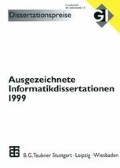Zusammenfassung
Die Fähigkeit eines Lehrers, die individuellen Fehlvorstellungen seiner Schüler zu erkennen und seine Lehrmethoden daran anzupassen, ist notwendige Voraussetzung für gezielte Förder- oder Individualisierungsmaßnahmen. Aufgrund des hohen Zeitaufwandes ist dies in der Praxis jedoch kaum möglich. In computergestützten mathematischen Lernsystemen konnten diagnostische Methoden bis heute nur bedingt eingesetzt werden, da bisherige Diagnosesysteme nicht schnell oder flexibel genug sind.
Access this chapter
Tax calculation will be finalised at checkout
Purchases are for personal use only
Preview
Unable to display preview. Download preview PDF.
Literatur
J.S. Brown and R.R. Burton. Diagnostic Models for Procedural Bugs in Basic Mathematical Skills. Cognitive Science, pages 155–192, 2 1978.
P. Baffes and R. Mooney. Refinement-Based Student Modeling and Automated Bug Library Construction. Journal of Artificial Intelligence in Education, pages 75–117, 7 1996.
R.R. Burton. Diagnosing bugs in simple procedural skills. In D.H. Sleemann and J.S. Brown, editors, Intelligent Tutoring Systems, chapter 8. Academic Press, London, 1982.
N. Dershowitz and J.P. Jouannaud. Rewrite Systems. In J. van Leeuwen, editor, Handbook of Theoretical Computer Science, volume B, chapter 6, pages 244–320. Elsevier, Amsterdam, 1990.
H.D. Ehrich, M. Gogolla, and U.W. Lipeck. Algebraische Spezifikation abstrakter Datentypen. Teubner, Stuttgart, 1989.
J. Friš. Grammars with partial ordering of the rules. Information Controll, pages 415–425, 17 1968.
H.D. Gerster and U. Grevsmühl. Diagnose individueller Schülerfehler beim Rechnen mit Brüchen. Päd. Welt, 11 1983.
K.M. Hart. Children’s Understanding of Mathematics, chapter 5: Fraction, pages 66–81. Athenaeum Press, New-Castle upon Tyne, 1981.
K. Hasemann. Die Beschreibung von Schülerfehlern mit kognitionstheoretischen Modellen. Der Mathematikunterricht, 31, 6 1985.
M. Hennecke. Online-Diagnose in intelligenten mathematischen Lehr-Lern-Systemen. Fortschr.-Ber. VDI, Reihe 10, Nr. 605. VDI Verlag, Düsseldorf, 1999.
J.W. Klop. Term Rewriting Systems. In S. Abramsky, Dov. M. Gabbay, and S.E. Maibaum, editors, Handbook of Logic in Computer Science, volume 2, pages 1–116. Oxford University Press, Oxford, 1992.
J. Loeckx, H.D. Ehrich, and M. Wolf. Specification of abstract data types. Wiley-Teubner, Chichester, Stuttgart, Leipzig, 1996.
G.A. Lörcher. Diagnose von Schülerschwierigkeiten beim Bruchrechnen. Päd. Welt, 2 1982.
P. Langley and S. Ohlsson. Automated cognitive modeling. In Proceedings of the National Conference on Artificial Intelligence, pages 193–197, Austin, Texas, 1984.
F. Padberg. Didaktik der Bruchrechnung, Gemeine Brüche, Dezimalbrüche. 2. edition.
F. Padberg. Über typische Schülerschwierigkeiten in der Bruchrechnung — Bestandsaufnahme und Konsequenzen. Der Mathematikunterricht, 3 1986.
A.K. Salomaa. Formal Languages. Academic Press, New York, 1973.
R. Schulmeister. Grundlagen hypermedialer Lernsysteme: Theorie, Didaktik, Design. Oldenbourg, München, 2 edition, 1997.
Author information
Authors and Affiliations
Editor information
Editors and Affiliations
Rights and permissions
Copyright information
© 2000 B. G. Teubner GmbH, Stuttgart/Leipzig/Wiesbaden
About this chapter
Cite this chapter
Hennecke, M. (2000). Online-Fehlerdiagnose in intelligenten mathematischen Lehr-Lern-Systemen. In: Fiedler, H., et al. Ausgezeichnete Informatikdissertationen 1999. GI-Dissertationspreis. Vieweg+Teubner Verlag. https://doi.org/10.1007/978-3-322-84823-9_8
Download citation
DOI: https://doi.org/10.1007/978-3-322-84823-9_8
Publisher Name: Vieweg+Teubner Verlag
Print ISBN: 978-3-519-02650-1
Online ISBN: 978-3-322-84823-9
eBook Packages: Springer Book Archive

